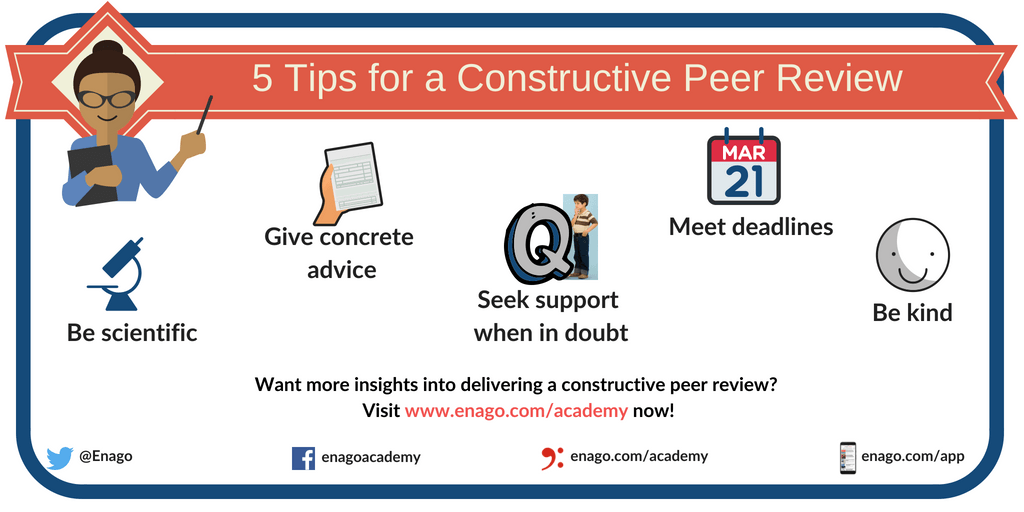Peer Review: 5 Smart Tips for Providing Constructive Feedback

Peer review is an extremely crucial aspect of the publication cycle. It helps ensure manuscript and journal quality. The process aims to provide written feedback in the form of commentary/criticism to the author, prior to the manuscript’s publication. Peer review involves two parts—reading and evaluating the reported research work, followed by communicating your assessment to the author (with advice on improving the manuscript for publication).
Constructive criticism can vary across reviews, but the underlying motive is to support and strengthen the writing in progress. Referees must walk a proverbial tightrope to provide strategically articulated, firm, but friendly feedback. A well-executed peer review improves scientific quality, verifies the originality of the reported research, and most importantly helps advance a researcher’s career. Several academic websites highlight the importance of the peer review process by providing guidelines and resources. In this article, we provide five key tips on how to share effective feedback to improve manuscript quality.

Do Be Kind
The basic premise of peer review is to encourage further writing. The manuscript is a draft that the author seeks helpful feedback on, thus requiring a fair appraisal. Frame your criticism positively, empower the author to improve their writing and develop ideas. Give the good news along with the bad news. Begin with a positive note and then move on to constructive criticism. Provide action-oriented criticism so that the authors can read and follow the necessary steps to improve their manuscript.
Do Give Concrete Advice
Be specific with your feedback. Backup your comments and opinions with evidence, examples, and suggestions for improvement. Be professional with the commentary. Reviewing is an aspect of academic work that requires a well-constructed analysis. This inevitably requires the referees to read the work critically. Look for strengths in the argument, the significance, brevity, and overall consistency in the manuscript draft. Additionally, list your analysis for guided improvement and provide it as concrete advice.
Seek Support: Don’t Assume
As an invited referee, you are professionally able to provide constructive criticism to improve the work of a peer. However, young scientists who review their first manuscript may learn efficacy via a senior mentor, journal clubs, or through online guidelines. Be sure to read the invitation to peer review thoroughly, check the due date, and follow specific instructions. Several guidelines are available for researchers beginning the process of peer review to follow through. The process can be deconstructed to two steps—reading the manuscript as a reviewer followed by writing a good review. Consider the ethics and also the competing interests that may exist for peer reviewers. After completion, refer to a peer review checklist to ensure that general guidelines of manuscript examination are met.
Be Scientific: Don’t Ignore the Details
Reviewers are often experts in their respective fields, although in some instances they might be invited to review a broader theme. Even if you are not an expert in the discipline, maintain scientific rigor, read critically, and accurately dissect the analysis. Alert the journal editor of any scientific inaccuracies, recommend if the manuscript should be accepted or redirected elsewhere. Some people consider that the system of peer review is inherently flawed leading to rising rates of paper retractions. However, attention to scientific detail as a referee may salvage the process. Sample peer reviews are available on academic websites, while others offer a framework for phrasing. Rigorous and scientifically accurate peer reviews provide accurate quality control.
Do Meet the Deadlines
The manuscript publication process depends on many factors including the timely submission of the peer review. When you accept an invitation to review complete it within the prescribed timeline. Stay organized and stick to the stipulated deadlines.











Comments are closed.